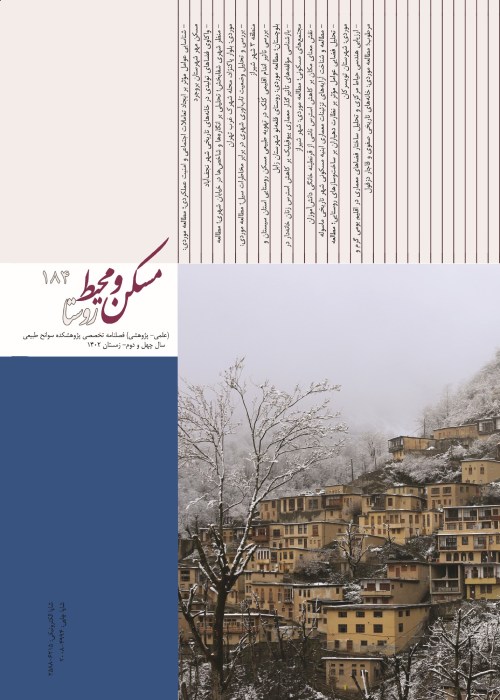The Quality of Life Assessment in Post Disaster (Flood) Rural Resettlement (case study: Resettlement villages in Pishkamar- Golestan province)
Abstract:
Introduction
Planned and involuntary resettlement after natural disasters has been considered as a major policy in post-disaster reconstruction in developing countries over the past few decades. Studies show that resettlement can result in significant adverse impacts on the resettled population. Conversely, a well-planned and managed resettlement process can lead to positive long-term development outcomes. Studies on post-disaster housing in rural areas of Iran reveal that these houses do not respond to all the needs of residents. During August 2005 a heavy rainfall event caused a great flood in Golestan province at North East of Iran. This flood damaged a lot of villages. After considerable and detailed discussions, planners and policy makers decided to relocate a significant number of villages and incorporate smaller villages in larger, pre-existing ones. Finally in this area villages were replaced and integrated in one place. Methodology
In the present study to evaluate the role of integrating villages to city to improve the quality of life the subjective indicators, levels of satisfaction has been used the decuple domains of environmental quality, housing, education, health, personal well-being, participation, entertainment and leisure, information and communication, employment and income and wealth. Research method is descriptive and analytic and to do it about 200 samples from city resident of Pishkamar randomly selected and the effects of integrating villages to improve quality of life have been studied by using subjective indicators. Data collection tool is a researcher-designed questionnaire that was produced according to research objectives. Used Questionnaire is formed mainly by questions with closed answers in Lykert spectrum five scales (much better: 5 to very worse: ). Discussion and Conclusion
results indicate that the integrating villages have been improved the quality of life in city of Pishkamar in domains of Environment, Housing, Education, individual Welfare, participation, information and communication, entertainment and leisure, wealth, health, income and only in the domain of employment has not improved. As indicates the share of each domain in the quality of life is not equal. Domain of education has the highest of causal effect, But domain of employment has lowest of causal effect. The resettlement policy in the study area may have been successful in reducing the flood disaster risk and improved quality of life (by relocating villagers), but it was not successful in permanent job creation. To reduce the negative economic impacts of resettlement, several measures must be implemented, including: strengthening production capacity and skills (through training and technology transfer); a diversification of economic activities (through the establishment of new economic activities and industries consistent with the rural environment); and increased financial support for the most vulnerable communities.Keywords:
Language:
Persian
Published:
Housing And Rural Environment, Volume:31 Issue: 137, 2012
Page:
97
magiran.com/p1002704
دانلود و مطالعه متن این مقاله با یکی از روشهای زیر امکان پذیر است:
اشتراک شخصی
با عضویت و پرداخت آنلاین حق اشتراک یکساله به مبلغ 1,390,000ريال میتوانید 70 عنوان مطلب دانلود کنید!
اشتراک سازمانی
به کتابخانه دانشگاه یا محل کار خود پیشنهاد کنید تا اشتراک سازمانی این پایگاه را برای دسترسی نامحدود همه کاربران به متن مطالب تهیه نمایند!
توجه!
- حق عضویت دریافتی صرف حمایت از نشریات عضو و نگهداری، تکمیل و توسعه مگیران میشود.
- پرداخت حق اشتراک و دانلود مقالات اجازه بازنشر آن در سایر رسانههای چاپی و دیجیتال را به کاربر نمیدهد.
In order to view content subscription is required
Personal subscription
Subscribe magiran.com for 70 € euros via PayPal and download 70 articles during a year.
Organization subscription
Please contact us to subscribe your university or library for unlimited access!


